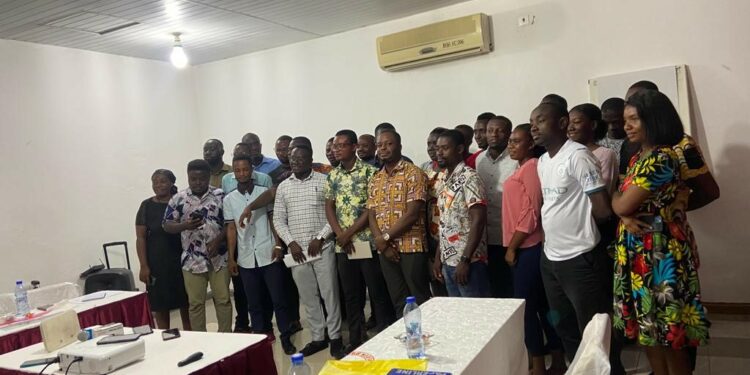Mineral Royalty Utilization: Ensuring transparency and accountability – Lessons from Prestea-Huni Valley Municipal Assembly
In recent years, the effective utilization of royalties derived from the extraction of mineral resources has become a subject of growing concern in many resource-rich countries like Ghana. A team led by Dr. Alex Ampaabeng and Dennis Gyeyir of the Natural Resource Governance Institute (NRGI), recently conducted a community forum in the Prestea-Huni Valley Municipal Assembly to address these concerns.
The forum aimed to assess the transparency, accountability, and citizen involvement in the utilization of royalties allocated to the Municipal Assembly from mining companies operating in the area. As mismanagement and delayed allocation of such royalties have been reported in mining communities, it is crucial to examine the allocation and utilization of these funds, ensuring they benefit local communities as intended.

Royalties and Fiscal Regimes in Ghana
Royalties serve as a form of “operations tax” imposed on taxable entities engaged in mineral operations in Ghana. The standard royalty rate stands at 5% on gross receipts, subject to exemptions in cases such as stability agreements. Mining companies operating in the country are also liable to pay corporate taxes on their revenues, with the extractive sector subject to a higher rate of 35% on taxable incomes. Notably, royalties are tax-deductible. Additionally, the government of Ghana holds a 10% participating interest in all mining operations nationwide.
Mining Sector’s Contribution and Importance
The mining sector plays a significant role in Ghana’s economy, contributing approximately 41% of the country’s total export earnings, 14% of tax revenues, and 5.5% of GDP. As a key revenue stream, the proper utilization of royalties is crucial for fostering economic development, improving public services, and benefiting local communities.

Analysis of Royalty Allocation and Utilization
Over a five-year period, the Prestea-Huni Valley Municipal Assembly received GHC18.3 million (approximately $3.4 million) in royalties, averaging GHC3.6 million ($372,000) per year. The assembly allocated more than 65% of these funds to capital projects annually. Notably, in 2019, despite recording a similar amount of royalty receipts as the previous year, only 36% was allocated for capital expenditure, highlighting inconsistencies in the allocation patterns.

However, the assembly’s commitment to capital expenditure is evident, particularly in areas such as education, healthcare, and sanitation. On average, expenditure on the environment, road infrastructure, and human settlement received the highest allocation, absorbing around 57% of the annual capital expenditure. Healthcare consistently received lower allocations compared to other sectors but saw a 19% share in the total capital expenditure commitment in 2021.

The Impact of Fluctuating Royalty Receipts
Fluctuations in royalty receipts have a significant impact on capital expenditure in the municipality. A reduction in royalty receipts leads to disproportionate cuts in capital expenditure. For instance, in 2019, when royalty receipts decreased by 4.2% compared to the previous year, capital expenditure was slashed by a staggering 71.2%. Similarly, in 2021, despite a 3.1% growth in royalty payments, capital expenditure fell by 34%. These fluctuations raise concerns about the resilience of capital projects and the ability to meet community needs consistently.

The Importance of Citizen Involvement and Accountability
To ensure transparency and accountability in royalty utilization, citizen involvement throughout the budgeting, procurement, and project execution processes is vital. The NRGI team’s engagements revealed that the Prestea-Huni Valley Municipal Assembly incorporates accountability mechanisms through town hall meetings and radio programs. However, the extent of citizen involvement remains unclear. Do citizens merely attend information-sharing sessions, or are they actively engaged in decision-making processes?
Citizens’ participation in procurement processes and oversight of capital projects also require attention. The accessibility of information, such as detailed project data, including contract sums, contractor details, project status, and payment details, is crucial for promoting accountability. Nevertheless, the lack of a publicly available formula for allocating royalties in different communities and expenditure items hampers transparency and accountability at the local level.

Recommendations for Enhancing Transparency and Accountability
Addressing the challenges associated with royalty utilization requires a multi-faceted approach. Firstly, the Prestea-Huni Valley Municipal Assembly should make the formula for allocating royalties publicly available. This step would enhance transparency, enabling citizens to understand how funds are distributed across communities and expenditure categories.
Secondly, it is crucial to strengthen citizen involvement and participation in decision-making processes. While town hall meetings and radio programs are valuable avenues for information-sharing, efforts should be made to promote meaningful engagement. Citizens, including women and youth groups, should be equipped with the necessary knowledge and tools to hold leaders accountable for the utilization of subnational revenues.
Furthermore, procurement processes should be transparent, with citizen participation encouraged to ensure fairness and prevent mismanagement. Citizens should have the opportunity to provide oversight on capital projects, ensuring that they meet community needs effectively.

The Prestea-Huni Valley Municipal Assembly’s commitment to capital expenditure is commendable, with a substantial portion of royalties allocated to various projects. However, addressing concerns of mismanagement, delayed allocation, and inconsistencies in expenditure patterns requires a comprehensive approach.
By organizing a community forum, the assembly can assess the level of transparency, accountability, and citizen involvement in royalty utilization. This forum should aim to empower citizens, foster dialogue between community leaders and assembly representatives, and emphasize the importance of transparency and accountability in the utilization of subnational level revenues. Through these efforts, the assembly can work towards ensuring that royalties benefit local communities and contribute to sustainable development in the Prestea-Huni Valley Municipal Assembly.








